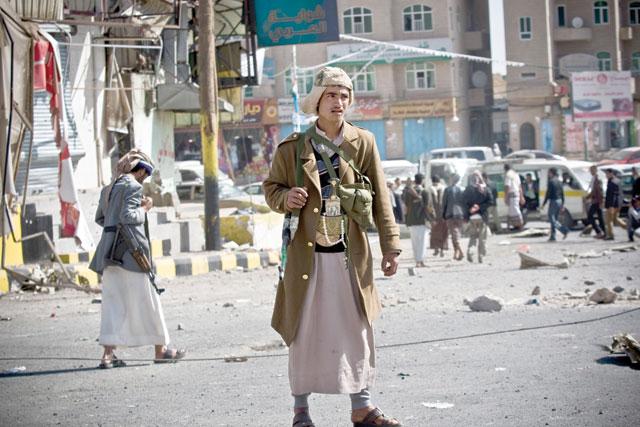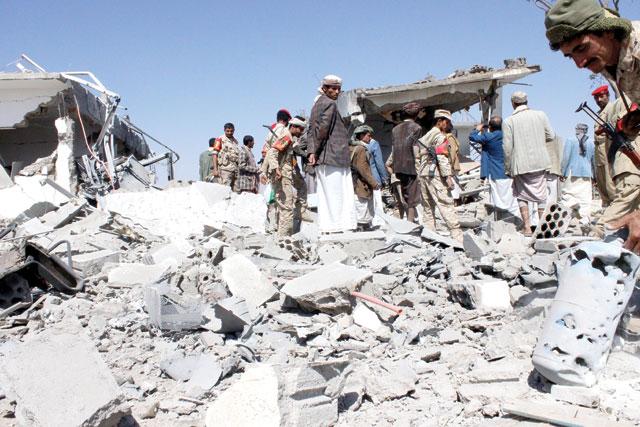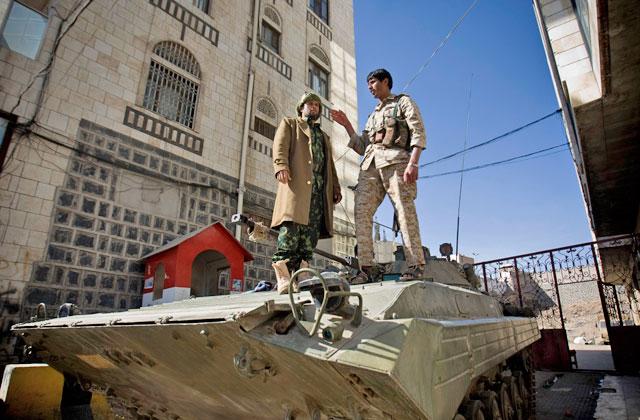You are here
Shiite militia attack Yemen president’s home, seize palace
By AFP - Jan 20,2015 - Last updated at Jan 20,2015

SANAA — Shiite militia fighters attacked Yemeni President Abed Rabo Mansour Hadi's residence and seized the presidential palace Tuesday in what officials said was a bid to overthrow his embattled government.
As the UN Security Council began an emergency meeting over the unrest, Secretary General Ban Ki-moon said he was "gravely concerned" and called for an immediate halt to the fighting.
The past two days have seen a dramatic escalation in violence in Sanaa, raising fears that Hadi's government, a key US ally in its fight against Al Qaeda, will collapse and the country will descend into chaos.
Information Minister Nadia Sakkaf said the militiamen, known as Houthis, had launched an attack on Hadi's residence, after witnesses reported clashes had erupted at the building in western Sanaa.
He was earlier reported to have been in the residence meeting with his advisers and security officials.
“The Yemeni president is under attack by militiamen who want to overthrow the regime,” Sakkaf said on Twitter.
Witnesses said the fighting outside the residence appeared to have subsided after two soldiers were killed.
A military official told AFP the militiamen had also seized the presidential palace in southern Sanaa, where Hadi’s offices are located.
“The Houthi militiamen have entered the complex and are looting its arms depots,” the official said.
Prominent Houthi member Ali Al Bukhaiti said on Facebook that the fighters “have taken control of the presidential complex”.
Ceasefire shattered
In New York, Ban urged “all sides to immediately cease all hostilities, exercise maximum restraint, and take the necessary steps to restore full authority to the legitimate government institutions”.
The fresh unrest shattered a ceasefire agreed after a bloody day on Monday that saw the Houthis, who overran Sanaa in September, tighten their grip on the capital.
Houthi fighters and government troops fought pitched battles near the presidential palace and in other parts of Sanaa, leaving at least nine people dead and 67 wounded.
The militia seized an army base overlooking the presidential palace, took control of state media and opened fire on a convoy carrying the prime minister from Hadi’s residence.
Prime Minister Khalid Bahah escaped to his residence, where he has lived since taking office in October, and it was surrounded late on Monday by the Houthis.
Tensions have been running high in Sanaa since the Houthis on Saturday abducted Hadi’s chief of staff, Ahmed Awad Bin Mubarak, in an apparent move to extract changes to a draft constitution that he is overseeing.
Mubarak is in charge of a “national dialogue” set up after veteran strongman Ali Abdullah Saleh was forced from power in February 2012 following a year of bloody Arab Spring-inspired protests.
Saleh has been accused of backing the Houthis and a source in the presidential guard told AFP some Yemeni troops still loyal to the ex-leader had supported the militia in Monday’s fighting.
The source, speaking on condition of anonymity, said groups of soldiers and fighters left the Sanaa home of Saleh’s son Ahmed, Yemen’s current ambassador in the United Arab Emirates, “to lend a hand to Houthi fighters”.
Residents said some soldiers had also abandoned their positions on the hill overlooking the presidential palace without any resistance to the Houthis.
Ally against Al Qaeda
Before his kidnapping, Mubarak had been due to present a draft constitution dividing Yemen into a six-region federation, which the Houthis oppose.
The militants, who hail from Yemen’s remote north and fought a decade-long war against the government, have rejected the decentralisation plan, claiming it divides the country into rich and poor regions.
Yemen has repeatedly accused Shiite-dominated Iran of backing the Houthis, who are also known as Ansarullah.
Since their takeover of the capital, the Houthis have pressed their advance into areas south of Sanaa, where they have met deadly resistance from Sunnis including Al Qaeda loyalists.
Yemen’s branch of the jihadist network, Al Qaeda in the Arabian Peninsula, is considered its most dangerous and claimed responsibility for this month’s attack in Paris on French satirical weekly Charlie Hebdo that left 12 dead.
Hadi’s government has been a key ally of the United States, allowing Washington to carry out repeated drone attacks on Al Qaeda militants in its territory.
The increasing unrest has raised concerns that strategically important Yemen — which borders oil-rich Saudi Arabia and is on key Gulf shipping routes — will become a failed state similar to Somalia.
Related Articles
Shiite militia fought deadly battles with the army in Yemen's capital on Monday before a ceasefire took hold, in the biggest challenge yet to President Abed Rabbo Mansour Hadi's rule.
An air strike killed at least 40 people at a camp for displaced people in north Yemen on Monday, humanitarian workers said, in an attack which apparently targeted a nearby base for Houthi fighters battling President Abed Rabbo Mansour Hadi.
Yemeni President Abed-Rabbo Mansour Hadi resigned on Thursday, a government spokesman said, throwing the country deeper into chaos days after Houthi rebels battled their way into his presidential palace.



















